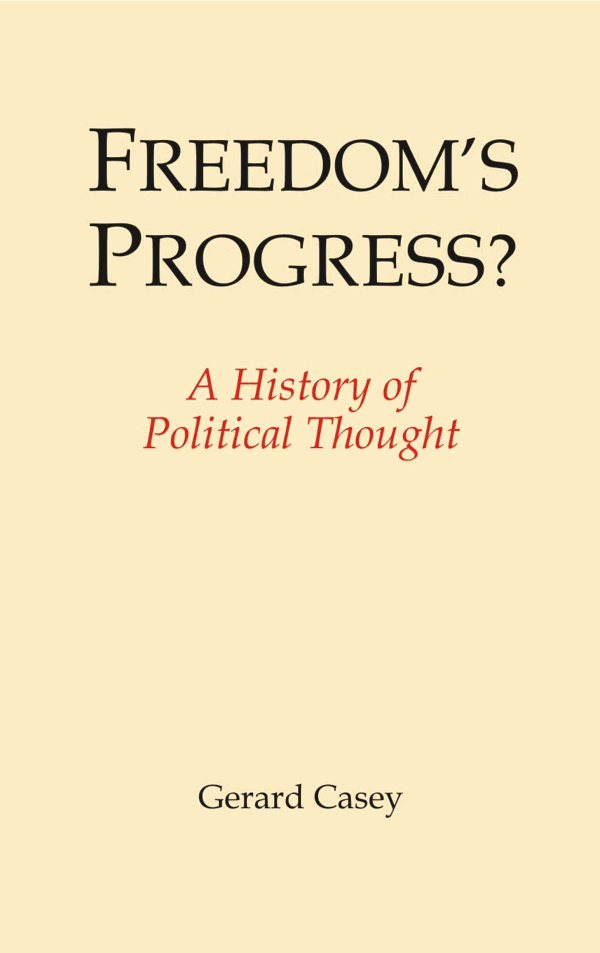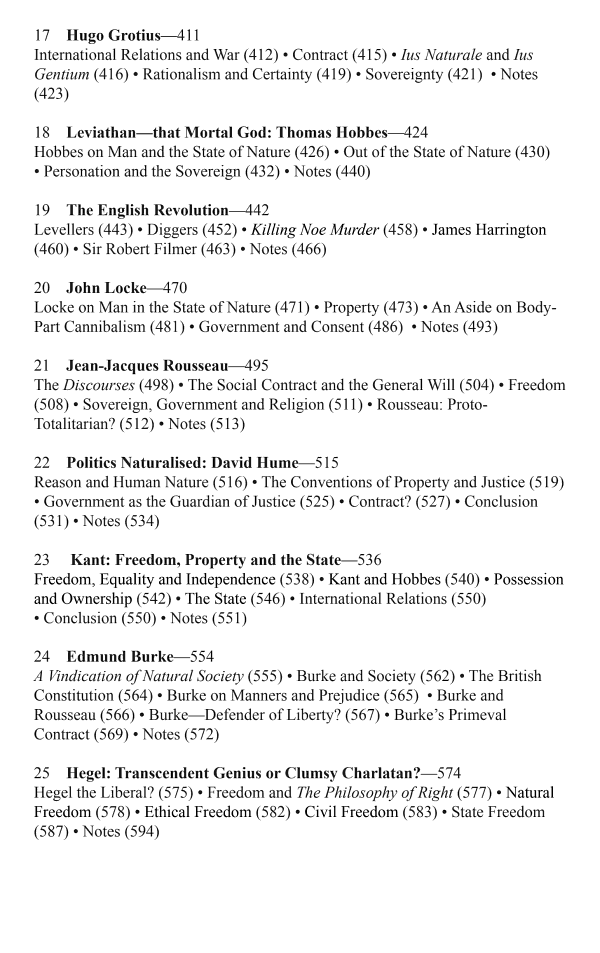



26 John Stuart Mill597 On Liberty (598) Was Mill a Utilitarian? (601) One Very Simple Principle? (603) Considerations on Representative Government (609) MillLibertarian? (613) Notes (616)
27 Back to the Future: Karl Marx617 Marxs Writings (621) The Alien World of Marxist Alienation (623) The Evil of Exploitation (626) Hunter, Fisherman, Shepherd, Critic (629) Class Struggle, Capitalism, Labour and Exploitation. (633) Politics and Economics (636) Exploitation Again and The Labour Theory of Value (637) Critique of the Gotha Programme (644) The Real Class Struggle (645) Where Are We Now? Terry Eagleton's Apology for Marx (648) Notes (653)
28 The Anarchist Prophets659 I: What is Anarchism? (659) II: William Godwin (665) The First Philosophical Anarchist? (666) Godwins Ethics (667) Godwin on Liberty of the Press (669) Godwin and Government (669) Property (674) III: Max Stirner (677) Stirner the Anti-Rationalist (677) Stirner on Ownness, Altruism and Duties (679) Stirner on Property (679) Notes (680)
29 The Classical Anarchists683 I: Pierre-Joseph Proudhon (683) ProudhonWhat is Property? (683) Proudhon and the Revolution (685) Proudhon and Order (686) Proudhon and Mutualism (686) II: Mikhail Bakunin (689) Adventures of a Would-be Revolutionary (691) Bakunin on the State and Authority (695) Bakunin and Marx (697) III: Pyotr Kropotkin. (699) Kropotkin, the Early Anarchist Years (700) KropotkinThe State and Mutual Aid (701) Kropotkin and Anarcho-Communism (702) IV: Anarcho-Syndicalism (707) Notes (708)
30 The Anglophone Anarchists710 I: Josiah Warren (710) Warren the Extreme Individualist (711) Warren on the State (713) II: Lysander Spooner (714) Spooner on Justice and Rights (715) Spooner on Law and Morality (716) Spooner on Government and Consent (717) III: Benjamin Tucker (721) Liberty (721) Tucker the Stirnerite (721) Tucker on Property (724) Tucker on the State (726) IV: The English Individualists (729) Auberon Herbert (730) Herbert, Adherent of Natural Rights and Defender of Property (731) Notes (735)
31 Twentieth-Century Tribalisms737 The Colonels Lady an' Judy OGrady are Sisters under their Skins (738) Irrationalismthe Philosophy of Fascism (741) Transcendence (745) Tribalism (753) The US Fascist Experience (756) Totalitarianism (765) A Note on Anti-Semitism and Eugenicism (768) Fascism, National Socialism and BolshevismChildren of the Left (770) Notes (776)
32 War781
War and Human Nature (783) War and the State (790) War and the Rise of the
Modern State (792) WarTax and Bureaucracy (795) War and the State in the
USA (799) War and the Totalitarian State (810) Notes (813)
33 Rand, Hayek, Nozick, Rothbard and Rawls817 I: Ayn Rand (817) Rand and her Inspirations (819) Rand's Political Philosophy (820) II: Friedrich Hayek (824) Order and Design, Law and Legislation (825) Liberty and Coercion (825) Rothbard's Critique of Hayek on Coercion (828) III: Robert Nozick (831) Anarchy, State and Utopia (833) IV: Murray Rothbard (840) Rothbard on Zero-Aggression (840) Rothbard on Human Nature (841) Liberty and Power (843) The State and Society (844) V: John Rawls (846) A Theory of Justice (847) Two Principles of Justice (849) Rand's Critique of Rawls (851) Accommodating Different Conceptions of the Good (852) The Law of Peoples (853) Notes (854)
34 A. Valediction858
Why Not Let the Dead Bury the Dead? (858) Aids to Freedom (860) A Few
Last Words on Liberty (862) Social Capitalism (868) Notes (873)
Bibliography875


To be governed is to be watched, inspected, spied upon, directed, law-ridden, regulated, penned up, indoctrinated, preached at, checked, appraised, seized, censured, commanded, by beings who have neither title nor knowledge nor virtue.
To be governed is to have every operation, every transaction, every movement noted, registered, counted, rated, stamped, measured, numbered, assessed, licensed, refused, authorized, indorsed, admonished, prevented, reformed, redressed, corrected.
To be governed is, under pretext of public utility and in the name of the general interest, to be laid under contribution, drilled, fleeced, exploited, monopolized, extorted from, exhausted, hoaxed, robbed; then, upon the slightest resistance, at the first word of complaint, to be repressed, fined, vilified, annoyed, hunted down, pulled about, beaten, disarmed, bound, imprisoned, shot, machine-gunned, judged, condemned, banished, sacrificed, sold, betrayed, and, to crown all, ridiculed, derided, outraged, dishonored.
Pierre-Joseph Proudhon
Acknowledgements
I owe a debt of gratitude to many people for helping me along the way in the composition of this book. First and foremost, thanks must go to Dr Thomas E. Woods for getting the whole thing started. While I was captive in his car on the journey from Atlanta to Auburn in March 2013, he made me an offer which I couldnt refuse to draft a series of lectures on the history of political thought for his LibertyClassroom website (www.libertyclassroom.com). I was gratified to be invited to contribute to this superb resource for lovers of liberty and I accepted the invitation. The lectures I produced for LibertyClassroom provide the foundation for this book. Some parts of the material have remained relatively constant over time but I have made significant additions and alterations to other parts, specifically to the material on Christianity and on Marx. Some material, such as that on Kant, Hegel, Rand, Hayek, Nozick, Rothbard and Rawls, is completely new. All in all, the material in this book is a much revised, expanded and more extensively researched and documented version of the LibertyClassroom lectures. Thanks are also due to my last PhD student, Jason Walsh, for holding up his end of our many conversations and for his eminently practical help in bringing this book into the world; to my son, Gerard Casey, for drawing the diagrams in the Plato chapter, to Andy Curzon and Garrett Barden for heroic and supererogatory feats of proof-reading, to Nikos Sotirakopoulos, author of The Rise of Lifestyle Activism, for his comments and criticisms on the Introduction and the chapters on Marx, Twentieth-Century Tribalism and Ayn Rand et al; to Carl Watner for his helpful suggestions in connection with the journal Liberty and its writers; to my University College Dublin colleague, Timothy Crowley, for his provision of links to stimulating and controversial material and for his psychic support, and to all the students, undergraduate and postgraduate, in University College Dublin who took my courses on Anarchy, Law and the State and Law, Liberty and the State and who, by their questions, objections and stout resistance, forced me to be less incoherent than I might otherwise have been. A very special thanks is due to the indefatigable Dr Walter Grinder for his circular emails with their extraordinarily helpful bibliographical suggestions, from many of which I have profited immensely. Also, in that connection, I thank the Book Depository for all the books (see the bibliography!) delivered to me post free but not, alas, cost free; as I have been intellectually enriched, so have I been financially impoverished. Actually, now that I come to think of it, perhaps the people at the Book Depository should be thanking me! I steadfastly refuse to allow anyone else to claim credit for any errors, omissions, inaccuracies and distortions; theyre mine, all mine. More to the point, no one besides me shoulders the responsibility for the frankly partisan nature of the text which, at Some point or other, is sure to annoy or even upset not only those who hold views on the nature and importance of liberty that are diametrically opposed to mine but even some whose views on the topic of liberty largely coincide with mine. But then, I am of one mind with Kingsley Amis who once said, If you cant annoy somebody with what you write...theres little point in writing.















